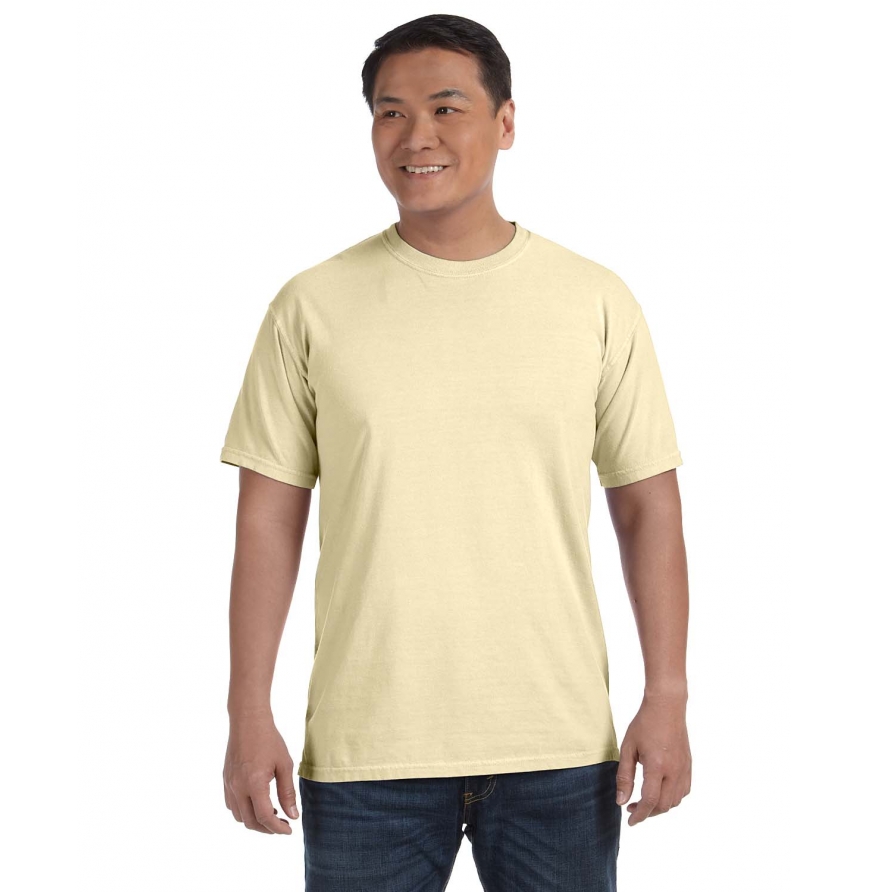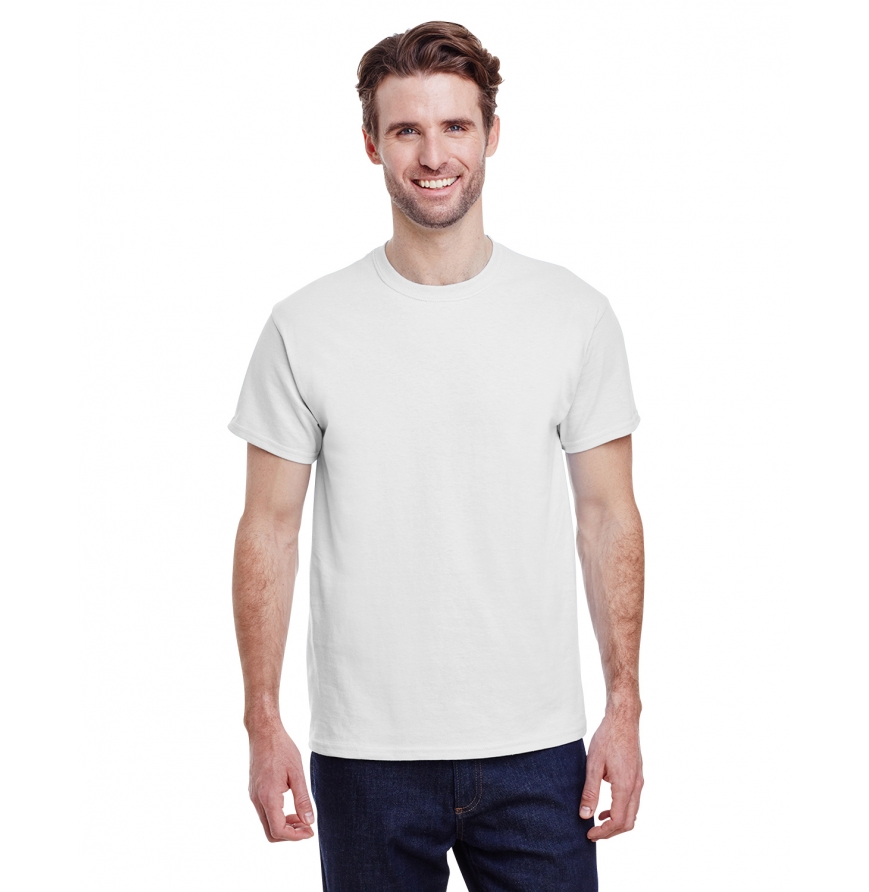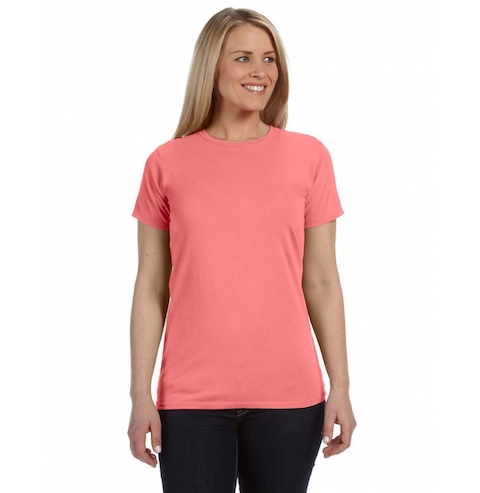
Choosing the right t-shirt for your designs can prove challenging; it's not just about colors and styles, but you also need to consider fabrics and weight. Fortunately, you're in the right place to learn more about fabric weights and how this can impact your t-shirts designs.
As you research what t-shirt blanks to use for printing, you may have noticed a description such as, "Heavy Cotton 5.3 oz T-Shirt." However, if you're learning the apparel business, you might have uncertainty about what the "oz" in the description means.
Does it mean the entire shirt weighs 5.3 ounces, and why does that matter? Well, "oz" does stand for ounces, and this measurement is particularly important.
It's a reference to the thickness of the t-shirt fabric. This description helps you to understand which t-shirts are suitable for your project. In textiles, the weight of a square yard of fabric is the designated weight of the t-shirt material.
The average t-shirt weight is somewhere between 4.5 oz and 6 oz. Weight below this range is comparatively not as durable.
In some instances, however, a lightweight t-shirt material is appropriate, for example, shirts that might serve as a novelty item for one-time use, such as for an event.
Alternatively, you may want to design a t-shirt with a tissue-like, fine jersey or sheer material. This kind of design is popular in some markets, such as women's wear.
Manufacturers categorize t-shirt material by weight. There are three overall t-shirt weights, including:
• Lightweight
• Midweight
• Heavyweight
Let's have a closer look at these t-shirt weight categories.
A heavyweight t-shirt weighs 6 oz or more per square yard of material. It's thick and provides a feeling of heft in hand.
This class of t-shirt material is typically less breathable than lighter weights. The breathability of t-shirt material is determined by the amount of space between the fabric and the fabric type.
Heavyweight t-shirts are expensive compared to other t-shirts, but on the plus side, these are also more resistant to shrinkage, have heavier stitching, and are more durable.
We recommend the Comfort Colors Adult Heavyweight RS T-Shirt which weighs 6.1 oz and is 100% ringspun cotton

Mediumweight t-shirts weigh between 5 oz and 6 oz. This class of t-shirt material offers the benefits of both heavyweight and lightweight t-shirts.
You might use this weight of t-shirt material when designing clothing items for fall and spring since these keep wearers a little cooler compared to a heavyweight t-shirt.
The most significant advantage of a midweight t-shirt is that it gives you the benefits of a lightweight shirt. But, at the same time, this material gives you the durability of a heavyweight.
As far as medium-weight shirts go the G500 Gildan Adult Heavy Cotton 5.3 oz T-Shirt is the best in its class.

A lightweight t-shirt weighs less than 5 oz. Usually, designers select this kind of material for summer t-shirt designs. Moreover, it's breathable, which makes it an excellent choice for exercise gear.
Lightweight t-shirt materials can tear easier and are more prone to shrinkage than their heavier counterparts.
Our recommendation for a women's t-shirt is the Comfort Colors Women's Lightweight RS T-Shirt at 4.8 oz.

The weight of the t-shirt will affect shipping costs. Not just from your supplier to your place of business, but also when shipping individual orders to your customers.
A single heavyweight t-shirt can weigh as much as half a pound.
T-shirts are a blank canvas. You can create any t-shirt design that you can imagine.
An attractive t-shirt design is an excellent way to express your style. However, it can also serve as a profitable business opportunity. Before you purchase your first order, however, you must do some planning.
For example, you must think about how size and style will affect your t-shirt fabric weight selection. You must also consider the design method you plan to use.
Alternatively, you may want to create an embroidery design t-shirt. In that case, the weight of the t-shirt will vary depending on the size and position of your design.
For example, you might want to create a small embroidery design located on a pocket or sleeve. In that case, a lightweight t-shirt material will suffice.
Conversely, however, you may want to create a design that demands heavier embellishing materials. For more expansive embroidery, it’s good practice to choose a heavyweight 5.4 oz to 6.1 oz material.
You may even need to add a cutaway backing to reinforce and hold your design in place. You could also use a polo shirt with a breathable weave and heavier cotton. Either option will prevent the weight of the embroidery from causing the t-shirt material to sag and pucker.
With screen printing, printers will press a single-colored dye at a time using a stencil and a permeable screen. Then repeat the process with different colors until creating the desired image.
It’s best practice to choose a tight weave for screen printing. A tight weave will prevent bleeding outside of the stencil and allow the dye to take correctly.
Depending on the size of the print, dyes aren’t heavy. As a result, you can usually use a 4.5 oz weight t-shirt material for this kind of design. This material also works well when designing soft t-shirts that drape the body and create a pleasant feel.
Finally, a tie-dye design is an excellent way to create a unique pattern for your t-shirts. With this method, it’s best practice to ensure that the t-shirt material is at least 60% cotton.
A 60% cotton material will ensure that the dye takes properly. Anything less may not produce the desired pattern or color saturation.
With material weight, however, the tie-dye process is more forgiving. The design will take to almost any t-shirt material weight.
If you’re planning to decorate your t-shirts yourself, however, you may want to start with a lightweight material of no more than 4.5 oz. Lightweight t-shirt material is easier to handle while learning the t-shirt business and various design printing methods.
We hope our short primer on t-shirt weight has you well on the way to creating the perfect designs. As with any business, however, success in the t-shirt business depends on choosing the right partners. AllDayShirts.com is here to help.
Start sourcing high-quality t-shirts for your projects today. Please feel free to browse our online selection of premium products.